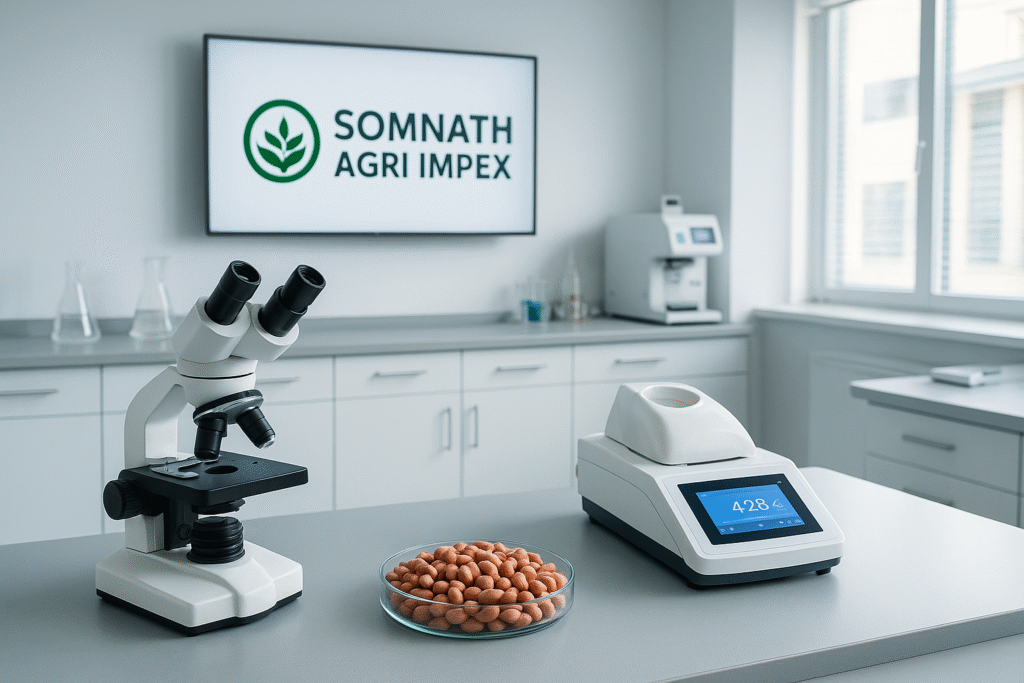Table of Contents
Nothing matters in the export of peanuts like quality. One shipment failure caused by contamination, or low grades, may cost you thousands of dollars and hurt your reputation in the market. This is the reason clever importers always check the quality of peanuts (particularly the highest-grade ones such as Java peanuts) before closing any deal.
India, particularly Gujarat, is one of the world’s leading peanut exporters. Working with the Best Peanut Manufacturer in India not only ensures a steady supply but also gives you peace of mind. This guide will walk you through every factor to check before export — from sampling and lab testing to packaging and documentation — so you can confidently source from trusted suppliers like Somnath Agri Impex.
Why Peanut Quality Checks Are Non-Negotiable
Peanuts are consumed worldwide — roasted, in confectionery, for peanut butter, oil extraction, and more. Because they’re a food product, quality failures can lead to:
- Health hazards (aflatoxin contamination is a serious food safety issue)
- Shipment rejection at ports due to failing regulatory checks
- Financial losses from delayed replacements or refunds
- Loss of credibility with buyers or distributors
India’s export systems (like APEDA’s Peanut.NET) were created to avoid these problems, giving exporters and importers a traceable, certifiable path from farm to shipment.
Step-by-Step Guide: How to Check Peanut Quality Before Export
1. Sampling & Visual Inspection
Start by requesting samples. High-quality peanuts should be:
- Uniform in size and shape
- Clean — free from visible dirt, stones, or debris
- Fresh in smell — no musty or rancid aroma
- Correct color — Java peanuts, for example, have small, round, red skin and a subtle sweet note
By physically inspecting the sample, you catch basic issues before investing in expensive lab work.
2. Laboratory Testing & Certification
This is where science ensures food safety. Key tests include:
| Test | Ideal Standard | Why It Matters |
| Moisture Content | ≤ 7–8% | Prevents mold & aflatoxin growth |
| Aflatoxin Levels | < 4–20 ppb (depends on destination) | Compliance with global food safety laws |
| Admixture / Foreign Matter | ≤ 1–2% admixture; ≤ 0.5% foreign matter | Maintains purity and grading accuracy |
| Counts per Ounce | Java peanuts: 50/60, 60/70, up to 140/160 | Matches buyer specification for size |
| Fungal & Bacterial Load | Negative or within accepted limits | Required for some countries (e.g., EU, U.S.) |
Pro tip: Always ask for independent lab certificates. The best suppliers will share this upfront.
3. Processing & Hygiene Standards
Beyond the peanuts themselves, you need to verify how they’re processed. Leading exporters in Gujarat typically have:
- Modern shelling & grading machines
- Automated color sorting to remove damaged nuts
- HACCP, ISO, and FSSAI certifications
- Clean, audited facilities with pest-control systems
This matters because even top-grade peanuts can be contaminated if handled poorly during processing.
4. Packaging & Shipping Preparation
Correct packaging prevents damage during transit. Options include:
- Jute or PP bags: Common, cost-effective, breathable
- Vacuum-packed bags: Ideal for longer shelf life and sensitive markets
- Nitrogen-flushed packs: Keeps freshness for high-end markets
Standard export containers usually carry around 19 MT per 20′ FCL, with 25–50 kg bag weights. Always confirm:
- Clear labeling: grade, count, lot number, origin, and packing date
- Bag strength (no tearing)
- Moisture-proof liners if shipping to humid climates
5. Documentation & Legal Compliance
This is the part many buyers overlook. Make sure your supplier provides:
- APEDA Peanut.NET traceability certificate
- Phytosanitary certificate (mandatory for most countries)
- Certificate of Analysis (COA) with test results
- Bill of Lading & Packing List with accurate details
- FSMA/FSVP compliance for U.S. shipments
Partnering with the Best Peanut Supplier in Gujarat simplifies this — they already follow these procedures daily.
Advantages of Sourcing from Gujarat with the Best Peanut Manufacturer in India
Why Gujarat? Because it’s India’s peanut powerhouse. Benefits include:
- Ideal climate for consistent peanut quality
- Advanced processing clusters — modern machinery, trained workforce
- Proximity to ports (Mundra, Kandla) reducing transit times
- Rich variety — Java, Bold, TJ, Redskin, and more
- Global reputation — trusted by buyers in Asia, Europe, and the Middle East
Somnath Agri Impex, for example, is recognized among the Best Peanut Manufacturers in India for its premium Java peanuts and strict export quality controls.
Common Buyer Mistakes to Avoid
- Skipping sample verification
- Not cross-checking certifications (some fake certificates circulate)
- Ignoring moisture and aflatoxin levels
- Focusing only on price — quality and reliability matter more long-term
Not specifying packaging (your needs may differ by market)
Conclusion
Checking peanut quality before export is not just smart — it’s essential. By following this guide, you can:
- Avoid costly shipment rejections
- Build strong, reliable supplier relationships
- Offer safe, premium products to your customers worldwide
If you’re looking for the Best Peanut Supplier in India, especially in Gujarat, Somnath Agri Impex provides export-grade Java peanuts with full traceability, rigorous testing, and global shipping support — ensuring every container meets your exact requirements.
What is the Ideal Moisture Content for Export Peanuts?
≤ 7–8%, depending on the intended use (lower for oil extraction).
Q2. What are “Counts Per Ounce” in Peanut Grading?
It refers to how many kernels fit into one ounce — smaller counts (like 50/60) are larger peanuts.
Q3. What do I do to Check the Compliance of Aflatoxin?
Have a known laboratory issue a Certificate of Analysis (COA) and verify that levels comply with your country requirement.
Q4. What is the Most Appropriate Packing used in Long Distance Exports?
Bags with nitrogen flushing or filled with vacuum provide excellent shelf life when compared to ordinary jute bags.
Q5. Why Choose Gujarat for Peanut Sourcing?
It combines excellent crop quality, advanced processing, and efficient logistics — a competitive edge for exporters and importers alike.


